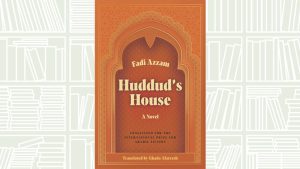
JEDDAH – Syrian poet and writer Fadi Azzam’s novel “Huddud’s House,” poignantly translated by Ghada Alatrash, paints a kaleidoscope of Damascene life, from its artists and lovers to its doctors and politicians, during its recent period of great turmoil and destruction.
Beginning at the cusp of the Arab revolution and civil war in Syria, the novel is an epic that delves into the depths and dark pits of the human heart. It is a searing depiction of humans’ capacity to love in all forms, resist and grow, as well as their power to destroy, oppress, and wage war.
Among its central characters is Fadi or Fidel Al-Abdullah, a law student, artist, womanizer, famous filmmaker, or religious extremist — depending on which part of his story you’re reading. His character arc is a prominent thread in the novel’s theme of identity and exile, capturing the nature of identity as perpetually in flux.His married lover, Layl, a doctor, is a complex portrayal of a woman torn between desire and duty.
Anees, a heart surgeon in Britain, sees his life take a swift turn when a phone call beckons him to the homeland. In Damascus, he inherits his grandfather’s property, Huddud’s House, initially poised as a promising windfall.
But the ancient house itself, and the locals who care about its heritage and cultural significance, help the doctor uncover its treasures and secrets such as historical artifacts and documents about Syria and her people painstakingly penned by its former guardians.
In the story, Huddud’s House stands as a powerful symbol of Syrian resistance and perseverance against oppression: “This was the fortieth time that this house encountered destruction, but its history testifies that each time it returned greater than before,” reads an excerpt.
“Huddud’s House” is an emotionally fraught and sweeping story of human connection during war, as well as a harrowing testimony partially based on true accounts of the brutalities endured by the Syrian people during the great upheaval of their homeland.
Azzam’s novel cements storytelling’s pivotal role in preserving truth, history, and heritage.
And at the heart of this particular story is a powerful idea: To love is to resist.
| For the latest updates, follow us on Instagram @arabnews.lifestyle
|
Source: Arab News



